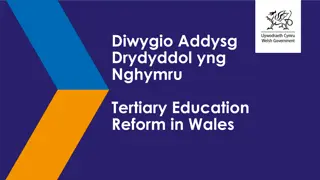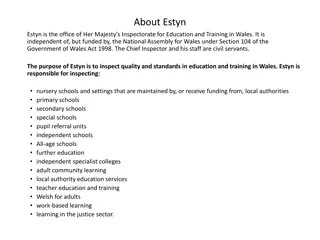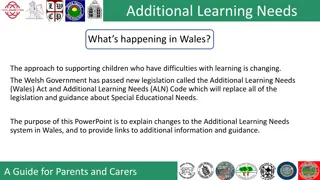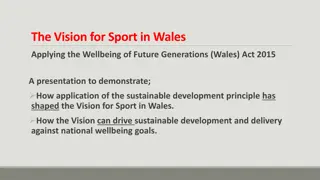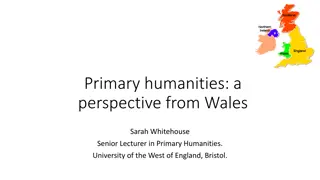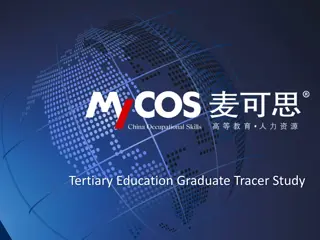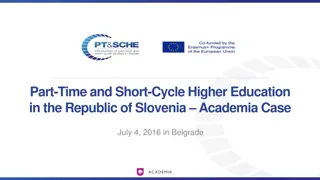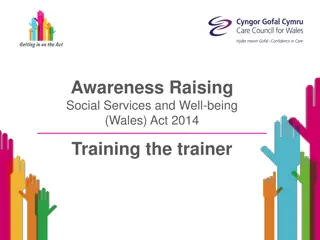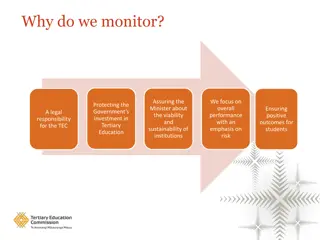Transforming Tertiary Education in Wales: The CTER Act Journey
Background Hazelkorn Review highlighted the need for a step-change in Wales' post-compulsory education system. The Tertiary Education and Research Act established the Commission for Tertiary Education and Research (CTER) to oversee further education, higher education, adult learning, apprenticeships, and training. The Act aims to address challenges like COVID-19 recovery, a greener economy, an aging population, and digital integration, with strategic duties towards lifelong learning, equality of opportunity, and increased participation.
Download Presentation

Please find below an Image/Link to download the presentation.
The content on the website is provided AS IS for your information and personal use only. It may not be sold, licensed, or shared on other websites without obtaining consent from the author. Download presentation by click this link. If you encounter any issues during the download, it is possible that the publisher has removed the file from their server.
E N D
Presentation Transcript
Tertiary Education Reform in Wales
Background Hazelkorn Review (2016) Post-compulsory institutions have played an important role in Wales history but a step-change is required Absence of an overall vision for the post-compulsory system aligned to the social, cultural and economic needs of Wales, regionally and nationally, now and in the future Government response (2017) The various sectors and providers are regulated and funded in different ways... Unhelpful competition between education and training providers, duplication or gaps in provision and confusion for learners Boundaries between higher education and further education, which once were clear, are now breaking down
The journey so far CTER operational Royal Assent August 2024 Bill in Senedd Sept 2022 Elections and govt returned Nov 2021 Draft Bill consultation Pandemic May 2021 2020 Legislation development Technical consultation 2019 Initial 2018 consultation Hazelkorn Review 2017 2016
What the Act does: The Tertiary Education and Research (Wales) Act will: Establish the Commission for Tertiary Education and Research (CTER), a new Welsh Government sponsored body. Dissolve the Higher Education Funding Council for Wales (HEFCW). CTER will be responsible for strategy, funding, and oversight of: Further education, including colleges and school sixth-forms. Higher education, including research and innovation. Adult education and adult community learning. Apprenticeships and training. The Welsh tertiary sector
Meeting the Challenges of the Future A changing UK and global context Rebuild from COVID-19 with a greener economy Ageing population Integrate digital technology into educational delivery Challenges of an unequal economy
The Strategic Duties of the Commission The Act sets out eleven strategic duties under which the Commission is required to exercise its functions. These legal duties are the long-term strategic purposes for the system, and reflect the Government s vision.
What will success look like? Expand lifelong learning opportunities across a wide range of modes, levels, and types of tertiary education. Improve equality of opportunity in tertiary education, ensuring greater access, continuation, and success for learners from under-represented and disadvantaged groups. Grow overall participation in tertiary education, reducing gaps in qualification levels between Wales and elsewhere in the UK. Improve the quality of tertiary education and learner experience in the sector so that learners have the knowledge, experiences and skills needed to thrive as engaged, employable and educated citizens. Ensuregreater collaboration between tertiary education providers, allowing different types of providers to focus on their diverse strengths and to collaborate for the benefit of learners and wider society. Align tertiary education, research, and skills development with the economic, social, and cultural needs of local communities and Wales a whole. Grow tertiary education provision through the medium of Welsh.
Top 6 innovations 1. Bringing post-16 education together - Wales will be only UK nation to have sixth-forms, colleges, universities, apprenticeships, and adult education managed as a single system. 2. A clear purpose for post-16 education - Sets out in law our values and ambitions for post-16 education in Wales. 3. A commitment to lifelong learning - The Act creates a new duty to fund proper facilities for further education for adults. 4. More Welsh medium education - The Act creates new duties to promote bilingual and Welsh-medium tertiary education provision. 5. Making sure learners and students are heard - Registration and funding conditions on providers to ensure students interests are represented and their wellbeing promoted and protected. 6. Welsh apprenticeships - New powers will enable Welsh apprenticeships to be aligned with the future needs of the Welsh economy.
Principles for change linked to the Well-being of Future Generations (Wales) Act 2015 A WALES OF VIBRANT CULTURE AND WELSH LANGUAGE A RESILIENT AND GLOBALLY RESPONSIBLE WALES A WALES OF COHESIVE COMMUNITIES AND A HEALTHIER WALES A MORE EQUAL WALES A PROSPEROUS WALES An accessible and effective TER system that supports learning, assessment and progression through the medium of Welsh and is central to Welsh cultural life. Tertiary education and research (TER) providers which maximise public value and are economically and environmentally sustainable. TER providers which are diverse and cohesive communities of learning, valued by the communities they serve. A system that provides lifelong learning and development for all, supports people to make informed choices about their future, and is accessible to all. A system that strengthens Wales economic well- being, collaborates with businesses, provides the skills employers and workers need, and grows our research and innovation base.
The ambition for students, learners and apprentices A joined-up national focus on the challenges facing students, learners and apprentices across the whole post- compulsory education sector. More information provided on options and qualifications available whether in school, further education, apprenticeships, or higher education. More opportunities to have your voice heard in the running of your university or college. Better protections for student rights, including a new right to a complaints scheme in further education.
The ambition for further education colleges and schools with sixth-forms A new approach to funding, with one organisation responsible for planning and funding post-16 education in schools and colleges. A more coherent approach to improving quality, with a single quality framework overseen by the Commission and improved coordination between Estyn and QAA. Improved collaboration and partnership between providers, working together in the interests of learners. Longer-term strategic oversight and alignment with local, regional and national education and training needs.
The ambition for universities and other higher education providers Clearer and more coherent regulation of providers which can adjust to the changing size and shape of the sector and the changing needs of Wales. A more level playing field in regulation between established full-time undergraduate providers and part-time, distance and postgraduate providers. A more strategic approach to widening access and opportunity, with a longer-term focus on securing positive outcomes. More opportunities for collaborating with external bodies in research and innovation funded by the Commission. Grow the scale, breadth and depth of our research and innovation base, through increased engagement between our universities, colleges and the private, public, and third sectors.
The ambition for employers, training providers and adult learning providers A new duty to fund adult education and a renewed strategic focus on lifelong learning and adult skills. A new, clear definition of a Welsh apprenticeship, establishing a gold standard for Welsh apprenticeships as sought-after and valued pathways from education into employment. More flexibility to develop new apprenticeship frameworks and to keep existing apprenticeships up-to-date to meet changing skills needs. Close collaboration between the Commission, providers, and Regional Skills Partnerships to inform planning, funding and strategic planning. A single organisation responsible to ensuring the Welsh economy has the skills it needs for businesses and communities to thrive.
Chair of the Board for CTER Professor Dame Julie Lydon appointed in December 2022 Role involves: Working with the CEO and Welsh Government Programme Board to ensure CTER is delivered on time and is fit for purpose for day one of operation Leading the CTER board in setting the strategic direction for CTER and evaluate the development and delivery of the organisation s business strategy, plans and performance objectives Engaging in and supporting CTER s stakeholder engagement activity, building relationships with sector leaders Chairing the CTER Board, putting in place effective governance arrangements
Chair of the Research and Innovation Committee (RIC) and Deputy Chair for the CTER Board Professor David Sweeney appointed in December 2022 Role involves: Chairing and facilitating RIC Committee meetings, putting in place effective governance arrangements Leading the Committee in setting the strategic direction for the Commission s Research & Innovation functions Deputising for the Chair in facilitating CTER Board meetings Supporting the Chair in leading the CTER board in setting the strategic direction for CTER Engaging in and supporting RIC and CTER s stakeholder engagement activity, building relationships with sector leaders
Chief Executive Officer Simon Pirotte was formally appointed in June 2023 and took up post in September 2023 Role involves: Providing strong and inspirational leadership, vision, and strategic direction to staff Shaping the new organisation s structure, operating systems, and its ways of working Ensuring the new organisation performs its functions effectively Principal adviser to the CTER Board, working with them to uphold CTER s independence in considering the effectiveness of funding, delivery and monitoring methods. Leading the sector to deliver world class innovative solutions to future challenges, placing learners at the heart of the system Building on the strengths of our current education system to better meet the challenges and opportunities ahead.
Establishment Phase The phase between the Commission s establishment and its operational date will be pivotal for the Commission to start building its: Capacity, Culture and Working relationships with a range of significant bodies across the sector
















